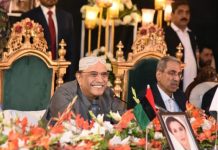Dr. Mehmood Ul Hassan Khan
Pakistan and Uzbekistan have been collectively working for achieving the desired goals of political stability, economic sustainability, social cohesion and strategic cushion of ethnic diversity in Afghanistan so that dreams of greater regional connectivity, immense socio-economic prosperity, energy & food security and last but not least poverty eradication may be achieved as soon as possible.
For centuries, Afghanistan has had been “ravaged” in tussle of absolute power obsession among the war-lords and regional powers alike. One the other hand, geographically, it has been the only easy and shortest route for Central Asia and South Asia connectivity for which power politics has been manipulating to win the chess-board of regional supremacy.
It has borders with all the neighboring countries of Central Asia which have been dreaming of regional connectivity to overcome physical impasses. Now end game is fading and regional rivalries are on the diminishing mode, peace in Afghanistan may be secured and sustained.
Uzbekistan-Pakistan bilateral relations have been further strengthened during recent times because of the better political understanding, improvement in bilateral trade, phenomenal rise to tourism and the last but not the least joint efforts to bring peace and harmony in the region especially in Afghanistan.
Pakistan and Uzbekistan have now been jointly working to achieve sustainable regional connectivity by avoiding spillover repercussion of end game in Afghanistan. Both countries have been pursuing an Afghan own & Afghan led solution for future of Afghanistan especially after the US withdrawal.
While delivering a “keynote” speech in recently held “Islamabad Security Dialogue” Chief of Army Staff Gen Qamar Javed Bajwa outlined various aspects and far-reaching consequences of South Asia security and prospects of regional connectivity with Central Asia Region.
Gen. Bajwa shared country’s unprecedented steps to enhance Afghanistan’s trade and connectivity by re-energising Afghan-Pakistan Transit Trade Agreement and also providing access to Afghanistan to export her goods to India, improving economic and trade environment along Pak-Afghan border by establishing border markets and development of infrastructure and last but not least, being part of energy and trade corridors binding Central Asia, South and West Asia through land routes and inviting Afghanistan to be part of CPEC.
Various spells of high official meaningful meetings have been in process in the capitals of Islamabad, Tashkent and Kabul to streamline the process of Afghan internal grand dialogue to reach on a consensus for its national wide stability, peace and harmony. Moreover, upcoming international conference in the month of July 2021 titled “Central Asia and South Asia: Regional Interconnectedness: Challenges and Opportunities would provide more valuable practical solutions for greater regional connectivity in the future.
Uzbekistan Foreign Minister H.E. Dr. Abdulaziz Kamilov has been visiting Pakistan and met with his counterpart Shah Mehmood Qureshi and Prime Minister Imran Khan. During his stay he thoroughly discussed means and ways to non-military solution in Afghanistan, increase in trade and commerce and enhance bilateral cooperation in diversified sectors of economy. It also showed Uzbekistan sincere efforts to bring peace in Afghanistan through regional resolve, dialogue and development.
On his part, Uzbek FM Abdulaziz Kamilov said Pakistan, as a regional power, can play role in guaranteeing regional peace and stability. The minister said: “Pakistan and Uzbekistan have common views on regional security, especially peace and stability in Afghanistan.”
Pakistan and Uzbekistan have been jointly working since long to achieve some kind of stability in Afghanistan. The journey of regional reconciliation and peace in Afghanistan started with Pakistan 6+2 & Uzbekistan’s 6+3 formulas which gained great popularity and acceptance among all the main stakeholders and power brokers but ultimately, complex and complicated end game prevailed and regional prosperity remained sieged.
Peace agreement of Doha between the USA and Taliban has not yet been truly materialized because of unending thirst of power, prioritization of personal profits, gains and taboos of different segments of Afghan society, political factions, various ethnic entities, clergy, and last but not least, political and philosophical differences among incumbent government, Northern Alliance and Taliban about the future orientation, nature, composition and set-up of new government. Grand internal dialogue has not yet been successful because of historic burden of inter-faith and inter-ethnic conflicts, conspiracies, contractions and destructions due to which Afghanistan has had been in mist of “rebels” and “rubbles” alike.
Although, most recently held international conference in Russia provided new imputes to Pakistan and Uzbekistan efforts to achieve peace in Afghanistan by seeking assurance from Taliban not to launch Spring Offensives against the government of Afghanistan but real peace in Afghanistan is still a far cry. Before this important conference, Uzbekistan FM H.E. Abdulaziz Kamilov paid personal visit to Tehran and Kabul and discussed different aspects of US withdrawal form Afghan soil from May 2021.
Uzbek FM met with Afghan President Ashraf Ghani and Chief Executive Officer & Afghanistan’s top peace negotiator Abdullah Abdullah in Kabul where he discussed issues of mutual interest between the two nations with a special focus on major economic, regional and transit projects, Afghan-owned and Afghan-led peace process and the fight against terrorism.
Pakistan and Uzbekistan have been providing necessary political, diplomatic, moral and economic support to Afghanistan to overcome poverty, energy & food shortages and budgetary deficits since long.
Uzbekistan can be the gateway for exports and imports via the Termez Cargo Center (rail and road) and Navoi International Airport. It will ensure Afghanistan’s greater connectivity with Pakistan’s Karachi and Gwadar ports. Uzbekistan is also a gateway to training and education for young Afghans through the Educational Center for Training Afghan Citizens in Termez, a cooperative effort of Uzbekistan’s Ministry of Higher and Secondary Specialized Education, the European Union, and the United Nations Development Program.
Afghanistan has been stumbling factor for greater regional connectivity which must be now resolved for greater regional integration, prosperity and poverty eradication for which Pakistan and Uzbekistan have been jointly playing important roles.
Although Afghanistan is the binding hub between South Asia and Central Asia but Pakistan and Uzbekistan may also explore alternative routes to enhance regional connectivity. Uzbekistan’s reliance on Iranian Bandar Abbas Seaport seems to be lengthy and expensive too. Thus political realization should be there to value the strategic importance of alternative routes/corridors for regional connectivity between South Asia and Central Asia.
In this regard, government of Pakistan has already positively considered the option of alternative routes for greater regional connectivity by encircling Afghanistan. Trans-Regional Railway Project among Uzbekistan, Pakistan and Afghanistan is a giant step towards greater regional connectivity but it may be a wise move to also consider alternative routes/corridors between Pakistan and Uzbekistan.

















